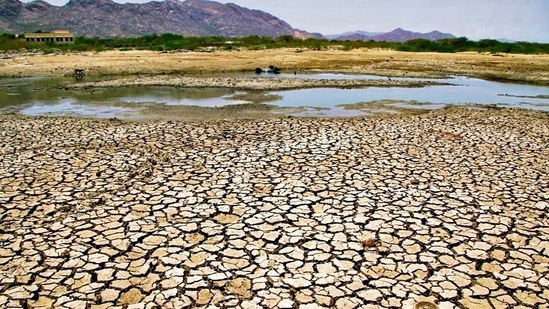Climate and Us | Who will compensate the Indian subcontinent for this heatwave?
The economic, social, health and psychological impacts of the heatwave should be documented by Indian authorities and attribution reports compiled so that the issue of addressing loss and damage.
India’s spring-early summer-intense heatwave spell in March and April is a result of the climate crisis. More than one scientific authority along with several scientists have suggested that this heatwave spell wouldn’t have been possible without the human-induced climate crisis.

On April 27, Frederike Otto, a climate scientist at the Imperial College of London and co-lead of the World Weather Attribution group tweeted:
The World Meteorological Organisation (WMO)’s response has been more tempered. On April 29, WMO said in a statement: “It is premature to attribute the extreme heat in India and Pakistan solely to climate change. However, it is consistent with what we expect in a changing climate. Heatwaves are more frequent and more intense and starting earlier than in the past.”
The attribution of this heatwave spell to the climate crisis should now be made clearly and emphatically. There is strong resistance among developed countries to refer to such attribution during climate negotiations. Why? Because developing countries will claim losses for the damage done to their ecosystems and lives of people from historical polluters.
Developing countries have been demanding that developed countries, responsible for historical carbon emissions, compensate for these losses and damages. Expectedly, developed nations — particularly the United States — have been wary of any such framework that will push for monetary compensation or specify the historical responsibility of developed nations.
“Loss and Damage” was one of the most debated issues of negotiation at the Glasgow climate change conference (COP26) last year. But the demands of developing nations were muzzled by the end of the meet.
The Glasgow Pact, an agreement which came out of COP26, instead of specifying how finance and compensation will be delivered for Loss and Damage, only talks of setting up a “dialogue between parties, relevant organisations, and stakeholders” to discuss how Loss and Damage can be addressed. Delegates and activists from developing and vulnerable countries were livid after reading the final text. The G77+China had proposed a Glasgow Facility on Loss and Damage, which was also discarded in the final text.
The IPCC report on Impacts, Adaptation and Vulnerability released in February, for the first time, recognised the concept of Loss and Damage. “Human-induced climate change, including more frequent and intense extreme events, has caused widespread adverse impacts and related losses and damages to nature and people, beyond natural climate variability. Some development and adaptation efforts have reduced vulnerability. Across sectors and regions, the most vulnerable people and systems are observed to be disproportionately affected,” the summary for policymakers (SPM) of the report stated.
IPCC said the term “losses and damages” refers to adverse observed impacts and/or projected risks and can be economic and/or non-economic.
Slow onset extreme weather events such as sea-level rise or long-term drought-like conditions can cause loss and damage to humans and ecosystems. These include economic losses, harm to health, well-being and cultural practices in many regions.
Hence, the economic, social, health and psychological impacts of the ongoing heatwave in India and Pakistan should be documented by Indian authorities and attribution reports compiled so that the issue of addressing loss and damage can be taken up again at COP27 in Sharm el-Sheikh, Egypt. Indian organisations such as the Indian Institute of Tropical Meteorology and the India Meteorological Department should also present their own analysis of heat records in different states and the national disaster management authority needs to keep a record of deaths (both indirect heat strokes during anytime of the day and sunstrokes) associated with the heatwave spell. The economic impacts of the spell could be far reaching because of the impact of heat stress on agriculture, productivity and labour. That will also have to be published.
The early summer heat wave spell in March and April may be unprecedented but does the response to the heat wave spell measure up? Even as the issues of “loss and damage” and “climate justice” are addressed at a global level, India needs to be prepared for such unprecedented weather events annually. Some state governments have taken measures including declaring summer vacations early, heatwave holidays in Odisha, water trains for parched districts in Rajasthan but perhaps an emergency like this needs several more interventions— both immediate and systemic.
What is India’s plan to deal with hot extremes that can silently kill several people? The heat action plans which are largely missing in most heat prone states need to be responsive rather than reactive to individual heat wave spells. That would mean a comprehensive policy on staggered school and work timings. The work timings for those outdoors, especially agricultural labour; construction labour; street vendors; utility workers need to be staggered as a matter of policy. Heatwave alerts need to reach every person in affected districts and thermal comfort in their living and working environments will have to be ensured. India’s plan to handle and secure its poor from heat stress is largely missing for now.
From the climate crisis to air pollution, from questions of the development-environment tradeoffs to India’s voice in international negotiations on the environment, HT’s Jayashree Nandi brings her deep domain knowledge in a weekly column
The views expressed are personal
Continue reading with HT Premium Subscription




